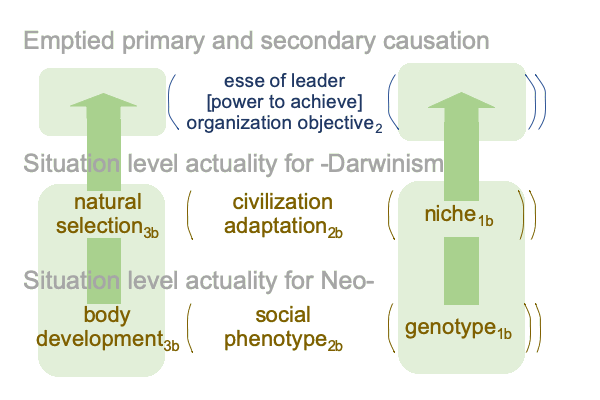Ramifications
0065 Armand Maurer offers an essay that traces the notion of secondary causes from Darwin, back through Suarez and Aquinas, all the way to the Neoplatonic Book of Causes. He aims to show that God’s greatness is not diminished by NeoDarwinian theory.
Indeed, the working comparison shows that the normal contexts of Divine Will3, natural selection3b and body development3b cannot exclude one another.
0066 This is not the view of the modern Zeitgeist, which declares that, in order for inquiry to be scientific, inquiry must exclude metaphysics.
0067 Darwin does not rise above the modern Zeitgeist. Nor can a reader expect him to. After all, the Zeitgeist fills the air that we breathe. The Zeitgeist stands between heaven and earth. There is no avoiding it.
At first, Darwin thinks that the concept of secondary causes provides a path to the acceptance of his theory. Unfortunately, this path is already blocked by the modern Zeitgeist. Later in life, Darwin declares himself agnostic.
0068 Now, I may ask, “What happens next?”
What happens in Western Civilization between 7660 and 7820 U0’?
If Darwin is on target about secondary causation, and if the modern Zeitgeist denies the possibility, then what happens when the esse of the thing [has power to cause] results2 is no longer contextualized by the primary cause?
What if the Divine Will3 and the Divine Presence1 are systematically ignored, even ridiculed?
0069 Nature abhors a vacuum.
The positivist intellect rules out metaphysics in scientific inquiry, setting up a scenario where natural selection3b and body development3b exclude the Divine Will3. Christians do not understand how to counter, because any attempt to respond meets the charge that the Christian is not scientific.
This leaves an opening for a new metaphysic, one that declares itself to be “not religious”.
0070 Does “not religious” mean the same as scientific?
Many moderns think so.
Indeed, how can a modernist distinguish between science and… er… a religious movement that says that it is “not religious”?
(See comments on Pennock’s eEssay on the distinction of science and religion, appearing at the end of June 2020)
Social Darwinism of the late 76th and early 77th century serve as an example. According to their dogma, humans inherit a social phenotype and are bound to certain civilizational adaptations.
Karl Marx, for example, envisions six stages, primitive barbaric communist, the slave, the feudal, the capitalist, the socialist and the communist. Social phenotypes differ for each one. For example, for feudalism, the two social phenotypes are the landowner and the serf.
According to Marxist myth, civilization progresses from one stage to another.
Each stage requires a different type of leader.
The esse of a leader includes the power to achieve adaptive organizational objectives.
0071 This calls to mind the master-work, How To Define the Word, “Religion”.
What is the potential1aC underlying the actuality of an organizational objective2aC?
Righteousness1aC.
For Social Darwinism, that righteousness1aC is “not religious”.
0072 Marxism becomes a brand of Social Darwinism.
Here is a general picture for the modern Zeitgeist.

0073 A vacuum is apparent.
Both modern intellectuals and the leader offer to fill in the blanks.
0074 Notably, the genetic basis of inheritance is not well understood during the century after Darwin. Mendel starts his experiments in 7653 U0’. James Watson and Francis Crick determine that the structure of DNA is a double helical polymer in 7753.
Consequently, what I call “body development3b”, “the phenotype2b” and “genotype1b” are more mystically configured by Social Darwinists. They are conceived as social development3b, cultural phenotype2b and identity1b. These terms appeal to folk psychology.
On top of this, even in very late Modernism, both intellectuals and leaders insist that human evolution is solely due to material and instrumental causes.
No one thinks that immaterial causes are relevant. This error is refuted in the master-work, The Human Niche.
Also, no one imagines a discontinuity between our current Lebenswelt and the Lebenswelt that we evolved in. This topic is addressed in the master-work, An Archaeology of the Fall.
0072 What is primary causation in modern movements that proclaim themselves to be “not religious”?
Different modern schools fill in the blanks in their own ways. Mercantilism, Fascism, Communism and Big Government (il)Liberalism each has its day. They each proclaim a different primary cause.
Maritain sees this. He lives to a ripe old age. He writes his essay on evolution, close to the end. He may not know how to put his vision into a precise, scientifically plausible, argument. He does know that the issue must be addressed, not by positivist intellects, but by rational intellects. Secondary causation must no longer be usurped by human agency. The slots for primary causation cannot remain empty.
0073 NeoDarwinism must be seen as an expression of secondary causation.
It is not the purpose of Maurer’s essay to show how.
The purpose is to show what must be done.
0074 The Book of Causes is translated into Arabic, by a Neoplatonic philosopher, living near Baghdad, shortly after al Ma’mun fails once and fails again, to reconcile Muslims, first, with one another, and second, with the rational intellect. Who would imagine that, a thousand years later, Charles Darwin would pick one of its key ideas, secondary causation, in order to justify his own scientific proposal?
The popularization of the idea comes through Aquinas, then Suarez.
The realization of the necessity of the idea comes through Maritain, and here, Maurer.
In this, the beauty of this essay excels.
